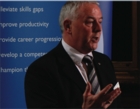A new era for delivering the skills needs of the building-services industry

A prosperous sector for many years to come — Keith Marshall, chief executive of SummitSkills.
The right skills in the right place at the right time and in the right quantities are the heady objectives of the sector skills agreement for the industry launched by SummitSkills.It is just over five years ago that Keith Marshall was appointed chief executive of SummitSkills, the sector skills council for the building-services industry. That appointment marked the beginning of a fresh approach to defining and meeting the training needs of the industries covered by the 25 sector skills councils. For the building-services industry, that five years has been filled with a huge amount of activity aimed at drawing up a sector skills agreement (SSA), a deal between employers, training providers and Government that will ensure demand-led skills and give employers the skilled workforce they require. Keith Marshall stresses that the SSA is the result of a ‘bottom-up’ approach involving the industry at all stages of its development. Not all sector skills council adopted this approach, but Keith Marshall is convinced that it was a ‘far, far better way’.
The sector skills agreement The resulting SSA identifies five skills priorities that will be tackled over a 3-year period — making it, as Simon Bartley, chair of SummitSkills, put it, ‘a living document and an ongoing business plan’. The effort and research that has been put into devising this SSA is revealed by facts and figures along the way. • 450 face-to-face interviews conducted and analysed.
• Over 475 people consulted in meetings, supported by over 24 000 letters mailed.
• Over 1450 h of desk research and writing.
• Over 14 500 calculations carrier out.
• 39 regional/national reports and summary document.
• 28 workshops in each region and country of the UK. Keith Marshall explains that it was very important that reports were both country and regional specific so that a final agreement and actions can be defined for each region and nation. Even before the agreement was published, plans of action for its implementation in the short, medium and long term had been devised. Keith Marshall says, ‘Implementation is not a quick fix, it’s an ongoing process to instigate real and lasting change.’
Skills needs Catherine Hickey, operations director of SummitSkills, provides an insight into the key issues highlighted by the analysis of skills needs.
 |
A living document and ongoing business plan — Simon Bartley, chair of SummitSkills. |
The first is skills deficiencies in environmental and renewable technologies. The absence of current and future skills planning was identified as making the sector weak to future client demands. Another problem identified was the lack of management focus. Very often the education and training available is not appropriate, so a fundamental overall of the current curriculum is required. The basic skills of new entrants and the IT skills of experienced workers are also both in need of improving. Finally, to utilise innovation across the sector, wider engagement with higher education was seen to be necessary.
Current provision Having dealt with the analysis of the skills needs, Catherine Hickey then spells out the key issues raised by the assessment that was made of current provision. While there is a lot of provision, there is also a lot of confusion, indicating a need for simplifying what is provided to remove confusion. There are also many courses that are not economically viable and surplus to the needs of the sector. Occupational standards need to be updated, and there is an urgent need of occupational standards for environmental technologies. Employers and providers of education and training also need to work together to make provision responsive. Finally, a sustainable network of higher-education provision is required.
 |
Analysing skills needs and assessing provision — Catherine Hickey, operations director of SummitSkills |
Going forward To take the SSA forward and carry out the activity contained within it, regional and national SSA implementation groups have been formed with the accountability and responsibility to ensure the delivery of SSA solutions in a given region and nation. These groups, led by employers, will meet quarterly to drive activity and review and monitor progress of the SSA delivery in their region. Five areas of activity have been defined for the first year. The first is to promote building-services engineering as an aspirational career choice for high achievers by improving careers guidance and active marketing. The second is to prove that training pays, by showing the benefits of training and clearly defining the contribution that training makes to increased productivity and profitability. With the growing importance of renewables and environmental technologies, the plan is to develop national occupational standards for current and emerging technologies and ensure that these are integrated with careers strategies and apprenticeship training frameworks. Fourth is to rationalise existing provision that is not fit for purpose and seek more effective use of public funding. Finally, to ensure that the supply of skills is matched to provision, SummitSkills will work with partners to develop authorised entry and progression routes for a specific number of people that has been directly linked to the sector’s skills requirements. This will ensure that new entrants have a realistic chance of employment in the sector and employers can support a sustainable number of workers. Keith Marshall summarises: ‘The sector skills agreement has now been agreed by all parties involved, enabling SummitSkills to roll out and manage a number of programmes to address the five skills priorities. The proposed solutions are of real value to employers and are set to make significant difference that will help safeguard a prosperous sector for many years to come.’
Related links:
Related articles:











